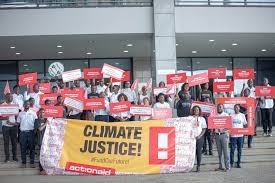As global temperatures continue to rise, climate justice advocates are pushing for urgent financial reforms and increased accountability from wealthy nations. Speaking during a recent webinar hosted by ActionAid, Teresa Anderson the climate justice lead at the organisation highlighted that the climate crisis disproportionately affects the Global South, where communities that have contributed the least to global emissions are suffering the most from extreme weather events.
“Climate change is reversing all of our progress on economic justice, women’s rights, and poverty reduction,” Anderson said.She highlighted the historic responsibility of the Global North, which has industrialised for over a century, releasing greenhouse gases (GHGs) that still linger in the atmosphere.
“The profound injustice of climate change is that the people causing the problem aren’t the ones bearing the brunt of its impacts,” she added.
Anderson said women, marginalised communities, and those living in poverty are hit hardest and that women are more likely to skip meals, carry the burden of care, and face increased risks during climate disasters. “Women and girls are often left out of decision-making processes, and as a result, their needs are ignored, exacerbating inequalities,” Anderson said.
She said ActionAid’s programs focus on empowering these vulnerable groups, ensuring that climate adaptation and disaster risk reduction efforts are inclusive.
Looking ahead to COP29 in Azerbaijan, Anderson warns that negotiations will be challenging. Wealthy nations are resisting calls to provide adequate climate finance to the Global South, with the agreed $100 billion per year target falling short and largely offered in loans, not grants.
“Far more money is flowing into the causes of climate change than into addressing it,” Anderson said, calling for new financial targets that place the burden on the Global North to fund loss, damage, and adaptation efforts.



